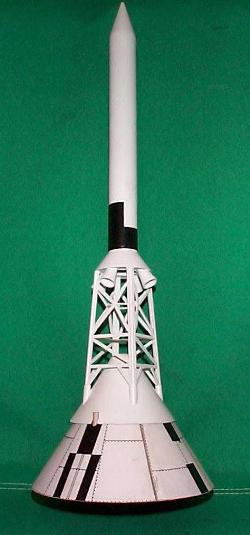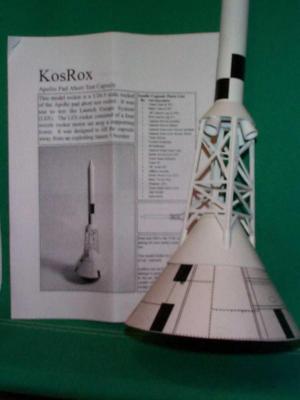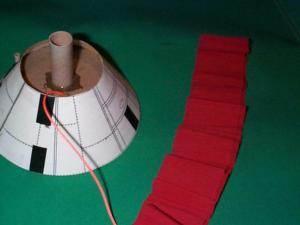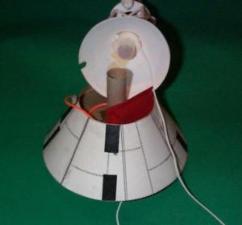KosRox Apollo Pad Abort Test Capsule
KosRox - Apollo Pad Abort Test Capsule {Plan}
Contributed by David Fergus
| Manufacturer: | KosRox |

(Contributed - by Dave Fergus)
 Brief:
Brief:
This model rocket is a 1/26.5 scale rocket of the Apollo pad-abort test rocket.
It was used to test the Launch Escape System(LES). The LES consisted of a four-
nozzle rocket motor set atop a supporting tower with a dummy Apollo capsule. It
was designed to lift the capsule away from an exploding Saturn 5 booster. The
kit model has a 5.8" base diameter, is 18" tall, has an 18mm motor
tube, and uses streamer recovery. It weighs 2.8oz. without an engine, and 3.4oz
with a B4-2. It is available for $15 plus shipping from KosRox.
Construction:
The quality of this kit is outstanding! All parts were of high quality,
precision cut, and easily identified from the parts list and pictures. The
packaging was a heavy plastic bag. All parts were present and none were broken.
There were nine paper shrouds precision cut to the correct inner and outer
diameter, with markings as appropriate. The nozzle shrouds even had the correct
curves for installing at the correct angle after curling and gluing. The tower
kit came in a separate little plastic bag that included all of the laser cut
struts. The nose cones are balsa, and the bulkheads are cardboard. The launch
lug is heavy duty, which is necessary due to the kit design.
Note from KosRox: KosRox does not supply decals. Tago Papa or Jimz are better sources.
The instructions are on 11 sheets with a picture accompanying all 39 assembly steps. The instructions were logical, well written, and included good tips for easier construction, such as clamping shroud seams with spare balsa strips and clothespins while the glue sets. The pictures that accompanied every step were clear, and were very helpful in clarifying the written guidance. The kit maker included "heads-up" where he anticipated possible errors by the modeler.
I puzzled over the instruction to spray mat sealer on the inside of the printed capsule shroud. I did not know what to use, and finally guessed on Krylon clear sealer (my decal sealer of choice). A caution here would be to not touch the shroud while it is drying, which I did and smudged the black printing on the capsule. The pattern is printed on an ink-jet printer and easily smudges. Step 21 has the " V" struts glued with a 1/4" inset. Shade this to the high side, or the circular structure ring will not meet tips of the "V"'s.
 Step 33 on the shockcord attachment is
confusing and needs better instruction. The intent of putting a loop in the
Kevlar® shock cord is to use the motor tube as the anchor the shock cord pulls
against. Only after the motor tube is inserted through the top bulkhead, the
loop in the shockcord, and then the bottom bulkhead; should the shockcord be
pulled taut through the small hole in the bulkhead, and glued. Because I did
this out of order, my shockcord loops around the motor tube, but has useless
slack inside the bulkhead. All of the shockcord strain is felt by the upper
bulkhead on my model.
Step 33 on the shockcord attachment is
confusing and needs better instruction. The intent of putting a loop in the
Kevlar® shock cord is to use the motor tube as the anchor the shock cord pulls
against. Only after the motor tube is inserted through the top bulkhead, the
loop in the shockcord, and then the bottom bulkhead; should the shockcord be
pulled taut through the small hole in the bulkhead, and glued. Because I did
this out of order, my shockcord loops around the motor tube, but has useless
slack inside the bulkhead. All of the shockcord strain is felt by the upper
bulkhead on my model.
Finishing:
For finishing, Elmer's F&F filled in the grooves on the BT-50 tower tube,
smoothed the capsule and tower nose cones, and the shroud folds. The roll
pattern was done by using black electrician's tape. It makes a lot straighter
lines than trying to mask and paint. I rate this a 4.5 for construction due to
the few minor nits mentioned above.
Construction Rating: 4 out of 5
Flight/Recovery:
Care must be taken when packing the crepe streamer so that it will deploy upon
ejection. When asked about prototyping the recovery system to include 3 tiny
chutes, the kit designer leaned against it. He had tried a chute and they did
not deploy consistently due to inward slope of the body cavity. On one of his
early designs with only one shroud instead of two, the model was light enough
for tumble recovery, but durability demanded double shrouds which leads to
streamer or chute for the added weight.
Because of the large 'cone' area of this rocket, it does not build up a very large velocity. At motor burnout, it decelerates very rapidly. The kit recommends a B6-4 for first flight, but I would use a B4-2, especially if you use several coats of white paint on the tower assembly.


Another big caution is to make sure the launch rod is clean as a whistle, and maybe even lubricated with baby powder. This rocket could stick on the rod due to the large moment arm between the motor and the top tip of the launch lug. The launch lug needs to be long to go through the whole body of the capsule, but also has to be offset from the motor tube to clear the tower assembly.
The motor is retained by tape friction rather than a hook, which would detract from the appearance. I rate this a 4.0 due to the inherent design difficulties of launch and recovery.
Flight Rating: 4 out of 5
Summary:
Overall: I rate this kit a 4.5 due to the uniqueness of the prototype, care in
the design and appearance, value for the $15 price, durability, and the new
skills it taught me.
Overall Rating: 4 out of 5
Q&A with Damian Kostron of KosRox:
1. How did you paint the roll pattern on the upper
body tube?
The roll pattern on my model ended up being black electrical tape. I painted
the jet rocket and applied a couple strips of black tape. Yeah, that is
cheating, but it works.
2. I really puzzled over what you meant by mat sealer.
I ended up using some Krylon clear (the same thing I use to seal and cover
decals), and it worked for it's intended purpose to keep the epoxy from
leaching through to mar the finish of the printed shroud; and except for
touching it while wet, would have been perfect.
'mat sealer' - any clear spray paint type of product that will provide
protection from moisture.
3. I was intrigued by your photos of some sort of
glue applicator out of my experience. I used Elmers Carpenters Wood Glue for
external use, unless you specifically called out for CA or epoxy. It has the
property of not running and a small amount holds parts together while you
orient them, and is sandable. The downside is that it shrinks. I used it to
anchor the wood dowels to the strut parts, and then backed it up with
CA.
The applicator is a nifty oiling bottle originally used for applying small
amounts of oil in tight areas. The 'needle' of the bottle is very large (in
comparison to a hypodermic needle) and allows me to use Elmers wood glue
(construction glue) in it. Although, frequent cleanings are necessary.
4. I messed up and touched the large shroud while it
was still damp from the sealer that I sprayed on the inside. I have a few
smudges of the black print into the white areas. Any suggestions as to how to
touch up?
Smudges...bummer. I used an Ink-Jet printer for the printed shrouds. The ink is
water soluble (I expect that there are a few other things that will dissolve
the ink as well). A clear over coat (like the 'mat sealer' or your Krylon clear
coat) is to protect the shroud from smudging. The only thing I could think of
to fix yours it to use a little white touch up paint on the smudge itself.
5. One other item of feedback is the shock cord
attachment to the main capsule. I did not do it quite right, upon reflection,
in that after the engine tube was affixed would have been the time to pull the
cord and loop tight and then glue where it goes through the bulkhead hole. I am
afraid that my loop is still loose and the anchor is the bulkhead itself. Your
description of how to do this was a little bit of a puzzle. Should I reinforce
the bulkhead somehow with cross bracing?
The shock cord is supposed to loop around the main engine tube. It will be
impossible to do this, once this tube is glued in place. Yes, it does provide
for an interesting puzzle during construction (and a little dexterity). This
'loop around the engine tube' is to provide strength to the shock cord. If your
shock cord has a knot that does not allow it to pull through the upper
bulk-head (but does not loop around the engine tube). I would suggest a
reinforcement consisting of a penny sized piece of card stock with a small hole
in it's center (just big enough for the shock cord). Then epoxyed into place
(effectively reinforcing the main bulk-head, keeping your knot from pulling
through).
6. I am nervous about the strength of the upper
shroud. Have you had shock cord damage of that shroud? Is there a way to
reinforce the inside of that shroud? Any other hints on avoiding damage during
recovery other than lubricating the launch rod? I am nervous about the
shockcord/streamer arrangement. The upper portion seems awfully close to the
main capsule... I am inclined to bring them down in two pieces with two small
chutes. A chute on the main capsule would be closer to the prototype, wouldn't
it?
This is a complicated series of question(s), with many possible answers. Let me
start by telling you about my 'boiler plate' models. I built three of them. One
was built with single layer shrouds (both on the nose section and the main
capsule) with parachute recovery. The second one was built with double layer
shrouds (both top and bottom) and streamer recovery. The third was double layer
bottom and single layer top with tumble recovery (no parachute or streamer) and
no shock cord attaching the pieces together. I built these models in stages
based on the outcome of the previous model (I intended on flying them until
they broke). On the first model several things happened that caused a redesign
of the rocket. The single layer main capsule was always getting very damaged
(the single layer card stock just wasn't strong enough). Also, I could not keep
the parachute from becoming 'char-broiled' (I think this has something to do
with the inside shape of the parachute/streamer packing area). The second model
fared a lot better with very little damage to the main capsule. However, I
found that the rocket tended to be a bit on the heavy side. The third model is
the one I continue to fly today. It is tumble recovery and sustains very little
damage on recovery (if I fly it on a nice grassy field). I elected to provide
(in the kit) a way of making the second model, as it was much more durable.
However, this is where a streamer becomes necessary as the model is heavier
(something was needed to slow the decent rate). If you are inclined to fly it
'prototypically', then you should have three parachutes on the main capsule
(and provide whatever protective recovery means you want to the tower).
Although, I think you will find it very difficult (maybe impossible) to pack
three parachutes into the rocket and to get them to reliably deploy. Recovering
the capsule and tower separately would eliminate the chance of damage (due to
parts 'snapping' back at each other). However, when you pack the recovery
devices (parachutes/streamers/what ever you use), make sure the upper device is
packed underneath the lower. This will help insure that the lower device is
'pulled' out. (I have had cases where the lower parachute would not come out of
the tight packing area of the main capsule). To reinforce the upper shock cord
mount, just make sure there is ample glue saturating the cord and that it has
at least 1 inch or more of the cord imbedded in the glue. Make sure the glue
doesn't interfere with the balsa nose cone and it's fit to the main engine
tube. If you fly it in two separate pieces, there will be very little stress on
the upper shock cord mount. Because of the large 'cone' area of this rocket, it
does not build up a very large velocity. At motor burnout, it decelerates very
rapidly and will be traveling very slow at ejection (always use a short motor
delay because of this). The double layer of shroud cardstock was my way of
reinforcing the shrouds. The upper shroud is unique in that it is the support
for the tower. With the single layer upper shroud, I would see damage if I
tried streamer or parachute recovery (both pieces together). But, it would only
sustain minor scuffs if recovered as separate units. Regardless of what
recovery method is used, try to have the tower section fall horizontally (I
know, it is difficult to determine this with out first flying it, and then it
may be too late). I have found that if the upper and lower pieces are recovered
separately using streamer recovery, and that if the tower is too nose heavy,
that the tower will fall nose first and will actually accelerate towards the
ground.
 |
 |